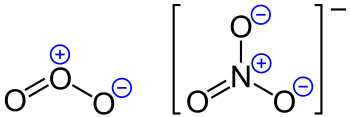Formal charge
In chemistry, a formal charge (FC) is the charge assigned to an atom in a molecule, assuming that electrons in all chemical bonds are shared equally between atoms, regardless of relative electronegativity.[1] When determining the best Lewis structure (or predominant resonance structure) for a molecule, the structure is chosen such that the formal charge on each of the atoms is as close to zero as possible.
The formal charge of any atom in a molecule can be calculated by the following equation:
where V is the number of valence electrons of the neutral atom in isolation (in its ground state); N is the number of non-bonding valence electrons on this atom in the molecule; and B is the total number of electrons shared in bonds with other atoms in the molecule.
Reference: https://en.wikipedia.org/wiki/Formal_charge









No comments